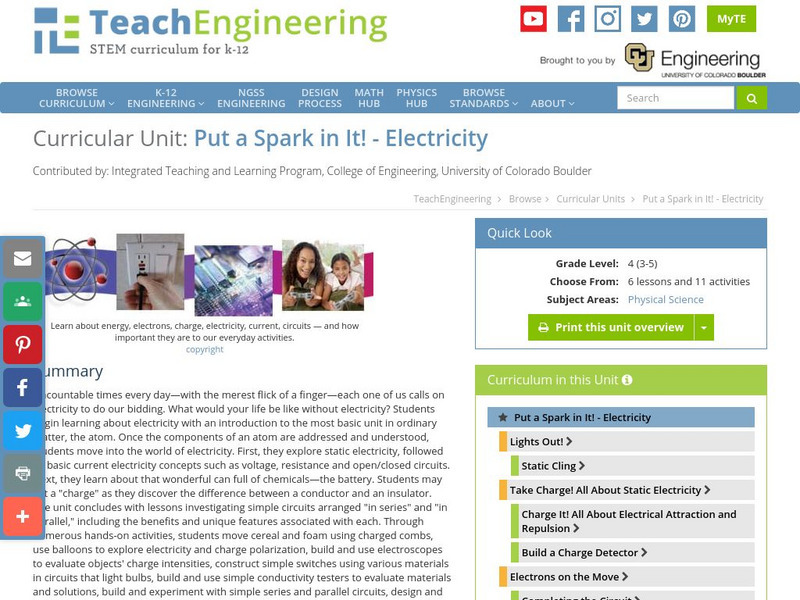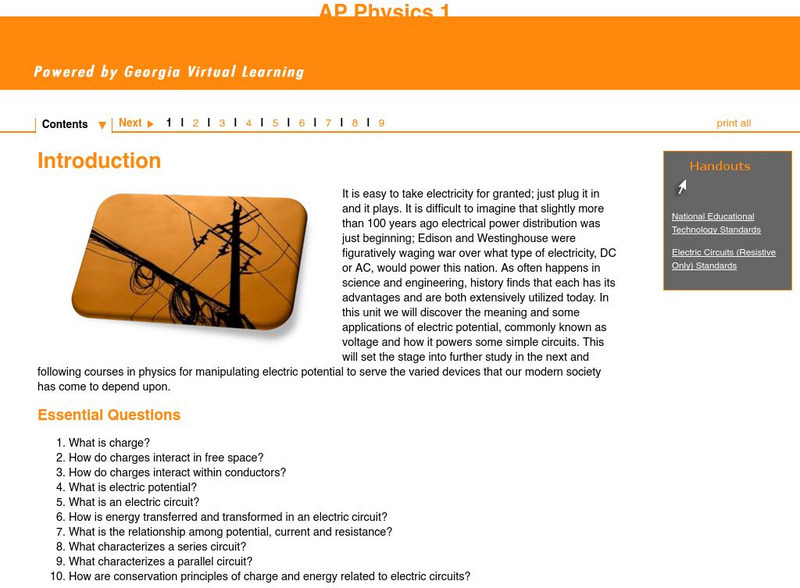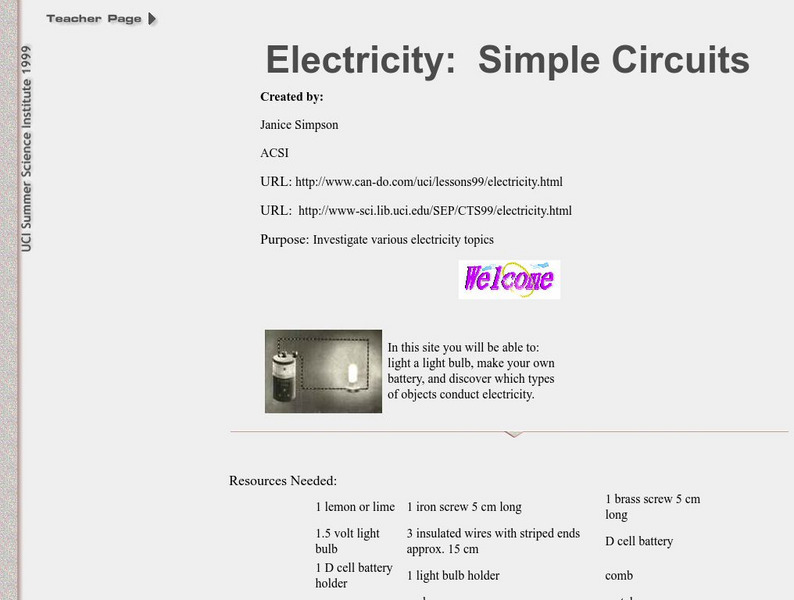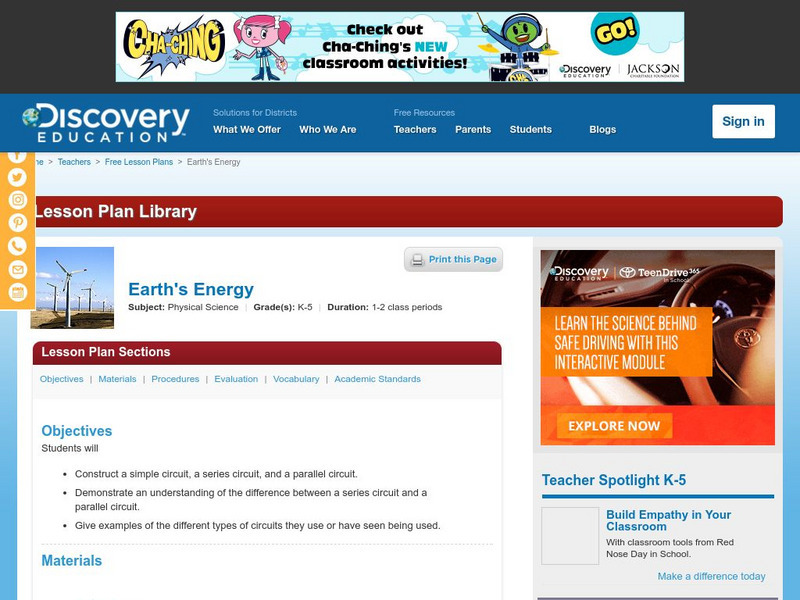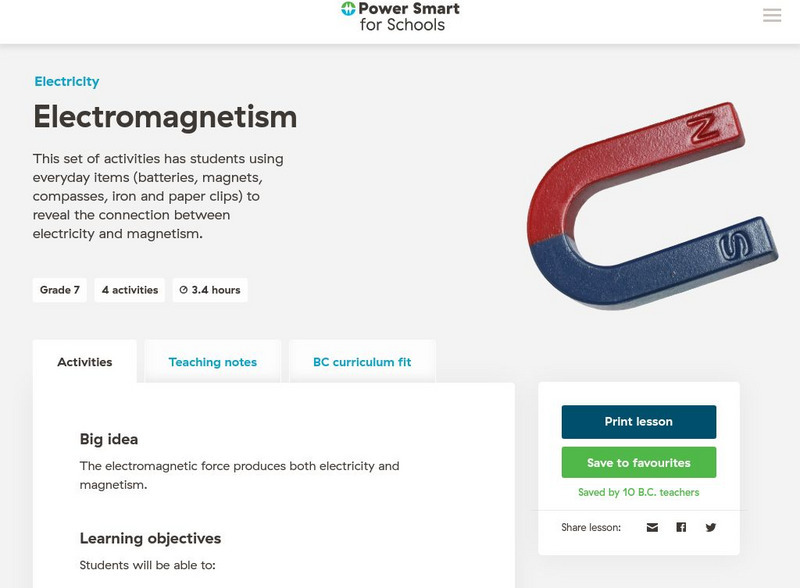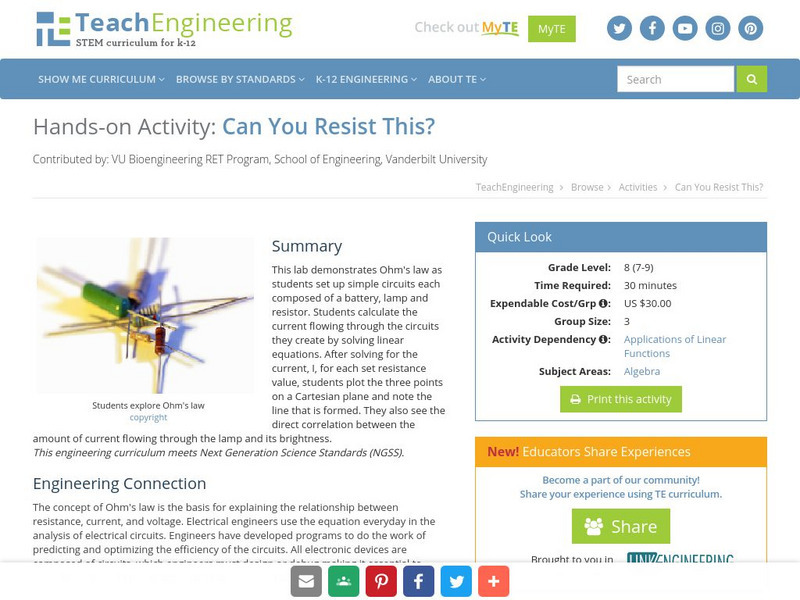Concord Consortium
Concord Consortium: Stem Resources: Heat and Light From Electricity
Understand the energy transformations that happens when you light a bulb with a battery. Activity requires students to build a simple circuit and take temperature and time measurements. Lab includes procedure with questions that can be...
TeachEngineering
Teach Engineering: Put a Spark in It! Electricity
Uncountable times every day "with the merest flick of a finger"each one of us calls on electricity to do our bidding. What would your life be like without electricity? Students begin learning about electricity with an introduction to the...
Georgia Department of Education
Ga Virtual Learning: Ap Physics 1: Electric Circuits
In this unit students discover the meaning and some applications of electric potential, commonly known as voltage, and how it powers some simple circuits.
TryEngineering
Try Engineering: Series and Parallel Circuits
The core of this lesson is simple circuits and the differences between parallel and series circuit design. Students perform experiments to test the differences between the two circuit designs using low voltage light bulbs.
Other
Electricity: Simple Circuits
Create your own simple electric circuit. Using simple supplies build your own battery and investigate conductivity. You can also construct a crossword puzzle with electrical vocabulary words.
Physics Aviary
Physics Aviary: Simple Circuit Lab
This lab is designed to have students investigate the relationships between voltage, resistance and current in a circuit with only one passive component. The batteries in this simulation can be varied from ideal batteries to batteries...
PBS
Pbs Kids:activities and Videos: Electricity
This PBS site offers videos and activities are hands-on challenges that focus on the engineering design process. They use simple materials, allow for multiple solutions, and are ideal for ages 9-12.
TryEngineering
Try Engineering: Electric Messages: Then and Now
Lesson investigates electronic communication from the Morse Code system to text messaging. To learn about this, students construct simple circuits, send messages to each other, and explore the history and impact of communication.
University of Colorado
University of Colorado: Ph Et Interactive Simulations: Signal Circuit
Learn how electricity flows through a circuit by watching how the electrons move.
Physics Classroom
The Physics Classroom: Electric Potential Difference
This tutorial is devoted to an understanding of electric potential difference and its application to the movement of charge in electric circuits. Take the interactive quiz to assess your understanding.
CK-12 Foundation
Ck 12: Fourth Grade Science: Physical Science: Electric Circuits
[Free Registration/Login may be required to access all resource tools.] Describes the parts of an electric circuit and identifies electric safety features and how to use electricity safely.
Other
The Blobz Guide to Electric Circuits
An exciting interactive site of games, activities, information, and quizzes about electric circuits. You'll learn what makes circuits work, all about conductors and insulators, switches, changing circuits, and circuit diagrams. Learning...
Other
Tech Topics: Electricity: Circuits
What is a circuit? How does it work? The animated diagrams and accompanying text will make it easy to understand the concept of circuits!
TeachEngineering
Teach Engineering: Simple Coulter Counter
Students build and use a very basic Coulter electric sensing zone particle counter to count an unknown number of particles in a sample of "paint" to determine if enough particles per ml of paint exist to meet a quality standard. In a lab...
Discovery Education
Discovery Education: Earth's Energy
A hands-on lesson for helping students understand simple circuits, series circuits, and parallel circuits, and the differences between the three.
TeachEngineering
Teach Engineering: Lights On!
Students in this activity will build simple circuits using a battery, wires, and light bulbs. This activity allows students to examine how electricity is conducted through a light bulb using a battery as a power source. Students will...
Other
Bc Hydro: Power Smart for Schools: Electromagnetism
This set of activities has students using everyday items (batteries, magnets, compasses, iron and paper clips) to reveal the connection between electricity and magnetism. Ideally, students will already have experience building simple...
TeachEngineering
Teach Engineering: Can You Resist This?
This lab demonstrates Ohm's law as students set up simple circuits each composed of a battery, lamp and resistor. Students calculate the current flowing through the circuits they create by solving linear equations. After solving for the...
TeachEngineering
Teach Engineering: Potato Power
Students use potatoes to light an LED clock (or light bulb) as they learn how a battery works in a simple circuit and how chemical energy changes to electrical energy. As they learn more about electrical energy, they better understand...
Science Buddies
Science Buddies: Solar Cell Power Output vs. Temperature
Solar cells provide a clean way of making electricity directly from sunlight. In this project you will build a simple circuit and experimental setup to investigate whether the power output of a solar cell changes with ambient temperature.
TeachEngineering
Teach Engineering: Pointing at Maximum Power for Pv
Student teams measure voltage and current in order to determine the power output of a photovoltaic (PV) panel. They vary the resistance in a simple circuit connected to the panel to demonstrate the effects on voltage, current, and power...
Physics Classroom
The Physics Classroom: What Is an Electric Circuit?
In this tutorial the concept of electric potential difference is discussed. Electric potential is the amount of electric potential energy per unit of charge that would be possessed by a charged object if placed within an electric field...
TryEngineering
Try Engineering: Electric Switches
Lesson focuses on how switches control the flow of electricity. Students are posed with the challenge of designing and building a simple switch into an electric circuit.
Physics Classroom
The Physics Classroom: Common Misconceptions Regarding Electric Circuits
In this tutorial, preconceived ideas regarding the nature of charge flow and the role of a battery in a circuit are addressed. In many instances, these preconceived notions about charge flow and batteries are incorrect ideas and are...

